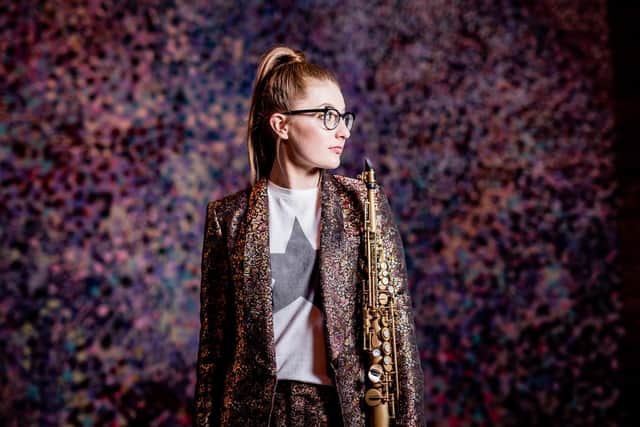Jess Gillam: 'Aside from Lisa Simpson, Barbara Thompson was the only female saxophone role model I had'


The 25-year-old admits she is itching to start work in earnest on her fourth studio album for Decca Classics; the issue at the moment is finding sufficient time and the right material.
“I’ve been trying out a few different things and talking to the label,” she says. “I’m keen to get it moving as soon as I can because I love recording and being in the studio. It’s just finding the right thing.”
Advertisement
Hide AdAdvertisement
Hide AdGilliam’s last album, Time, included two specially commissioned pieces for the saxophone – something that she hopes to continue on her next record, as she is keen to extend the classical repertoire for the saxophone.
“I think commissioning will continue to be a really important part of being a saxophone player today,” she says. “It’s a relatively young instrument so I almost see it as part of my duty to make as much new music for it as possible. It’s such a brilliant instrument, it should have more written for it.”
Having earlier this month performed at The Old Woollen arts complex in Leeds, Gillam will bring her eight-piece ensemble to St Peter’s Church in Norton-on-Derwent in July for a concert that’s part of Ryedale Festival. The programme, she says, will be the same.
“One of the things I find most interesting, actually, is taking the same music to different venues, seeing how you might think it’s going to be a totally different audience (and) definitely a totally different acoustic, and then seeing how you the music rises above that, transcends that.
Advertisement
Hide AdAdvertisement
Hide Ad“You’re trying to create the same space, in a way. Regardless of what the physical setting is, the metaphysical thing you’re trying to make is the same.”


The former BBC Young Musician of the Year finalist’s current ensemble is a mixture of old friends and musicians she met while recording Time. “This is our third tour together,” she says. “I spend a lot of the time on the road playing with different orchestras totally on my own, so to have a band and play with the same people and really get to know them and the music together it’s a really special feeling.”
With two violinists, a viola player and a cellist, as well as bass, percussion and piano, her ensemble is a cross between a string quartet and a jazz group. “I was looking for something that would give me as many options as possible for colour,” she explains. “It can transform into almost like a jazz trio or we can play baroque repertoire then add a little bit of something different with percussion or the piano. It’s very versatile, on-the-border of a few genres, which is kind of where I like to fit.”
This Classical Life recently returned to Radio 3, with one of Gilliam’s guests being the Leeds-based sitar player Jasdeep Singh Degun. She says she first began working with the BBC on a podcast when she was 18 or 19 years old “and then the radio show grew from that”. Early on, she says, she felt she was something of a novice – “I’d not had any training, I’d not done any broadcasting at all, but I loved speaking to people and I’ve always been an avid radio listener. When I listen to (those early shows) now, I definitely didn’t take to it naturally.” With more experience under her belt, she finds she “loves the medium of radio and TV, but radio especially, to be people’s friend and be part of their day, in a way”. The variety of guests is, she feels, “the overriding aspect that makes the show work – I think you learn a lot about a person through the music that they listen to, whether that be how that shapes their life or the role it’s played. Often a person’s tastes in music mirror parts of their personality. You can get to know a little bit about somebody just by the tracks they like to listen to. I learn something every time I sit down with someone about how they hear music and how they listen.”
Advertisement
Hide AdAdvertisement
Hide AdGilliam is a strong advocate for the European Concert Hall Organisation’s Rising Stars programme, which has enabled her to perform widely across Europe. “I think the friends that we have in concert halls in Europe were more part of our musical eco-system,” she says. “For me, it’s been an amazing opportunity to meet new audiences and play in venues that I wouldn’t necessarily have had the opportunity to play in otherwise. I think I’ve been to 12 different cities in Europe so far and seeing how audience reactions in each place is slightly different is really fascinating.”
At the point where we spoke, Gillam was due to travel to Berlin, to premiere Karl Jenkins’s work ’Stravaganza. The trip had been delayed by three years, she says, because of of the pandemic. “It will be interesting to hear it with the orchestra,” she says. “I’ve heard some midi mock-ups of the score and imagined what it will sound like, but I’ve no idea really what it will sound like with real instruments. It’s a very exciting moment, but it’s also one where there’s a little bit of anxiety.”
She also recently performed at a memorial concert for the ground-breaking saxophonist Barbara Thompson, who died last July aged 77. “Barbara was a huge inspiration to me,” Gillam acknowledges. “Aside from Lisa Simpson (from The Simpsons cartoon series), she was the only the only female saxophone role model that I’ve had. The way that she held herself as a person and as a musician, and also the way she was creative about how she directed her career and took a lot of responsibility for the business side of it as well as the playing and the composing, it was really fascinating to see. She was such a generous person with her time and a huge help to me . She was a huge loss to the saxophone world, but the concert in memorial was amazing, there were so many brilliant musicians paying tribute to her.”
Gillam continues to work with Saffron Sounds on a project that aims to inspire primary school pupils in Essex to make music. She says she is particularly cocnerned about the effect that cuts have had on music education in state schools. “I think every young person should have an opportunity to engage meaningfully with the arts and with music because it’s such a part of our culture,” she says. “We don’t suddenly become music lovers when we leave school and think, ‘I’m going to start learning that instrument’ because then there are even fewer opportunities.
Advertisement
Hide AdAdvertisement
Hide Ad“I think we should give every child the chance to at least see music and learn about it and be a curious listener, but ideally pick up an instrument and learn from it. It’s not about every child being a professional musician or going on to a career in the arts, it’s more about people coming together and learning to listen, using teamwork skills and co-operation and also creativity. We need creativity permanently in every single field. So there aren’t any downfalls to giving kids the opportunity, but they’re just not having those chances at the moment.”
As a girl, Gillam was herself the beneficiary of the Carnival Centre in Ulverston, which has since had its funding cut. “If I was a seven-year-old in Ulverston now, would I be playing saxophone?” she ponders. “I think there are so many children who have the potential and the will and would develop the skills but just never get the chance, which is a real shame.”
The Jess Gillam Ensemble play at Ryedale Festival on Thursday July 27. For the full festival programme, visit https://ryedalefestival.com/
